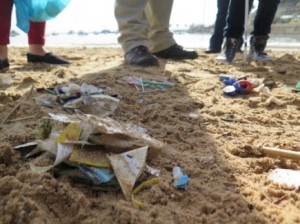 The majority of the litter that can be found in the sea and beaches is made of plastic. In Portugal, only 8% of the plastic litter is bigger than a bottle cap. On 1st of October of 2014, during the YRE Litter Less Campaign International Workshop, in Cascais, the participants were able to see it with their own eyes.
The majority of the litter that can be found in the sea and beaches is made of plastic. In Portugal, only 8% of the plastic litter is bigger than a bottle cap. On 1st of October of 2014, during the YRE Litter Less Campaign International Workshop, in Cascais, the participants were able to see it with their own eyes.
The accumulation of litter in sea and beaches can have several consequences for fish since meso and micro plastics are easily ingested by them, by mistake. This means we would be ingesting “plastic fish”. In fact only 20% of the whole rubbish found in beaches comes from sea, the rest comes from land, either being left on shore or, for instance, throwed in the toilet.
“There’s no consciousness.”, according to Justin Roborg-Sondergaard, a consultor that truly believes that even though there are still plenty of problems related to litter, they can be solved, mainly through the action of young generations.
Firstly, taking this as a serious and present problem it’s important to find solutions to it. Justin believes that one of the reasons that justify the presence of litter in the beaches is the existence of a linear economy production, consisting in production, consumption and waste. Although recycling is also becoming more and more present, the problem is that there is a great sum of waste that can’t be recycled and ends up on the beach.
Justin also thinks that “this linear process should be converted and closed into a circular economy.” By doing this, every chain of production and consumption would be within the economic circle, which would result in a more active and responsible community.
Both Richard O’Sullivan, chair of Surfrider Foundation Europe, and Justin Roborg-Sondergaard agree that the best way to make people informed about this litter’ problem is by making attractive and modern designs instead of using the big informational texts. These designs would focus in trying to get people’s attention much easier and faster and, also to make sure the message prevails in their minds.
The Portuguese Coastwatch Coordinator, Guilhermina Delgado, also feels that the main message is that the primary responsability is of youngsters.This means, they should start changing perceptions and attitudes, taking actions. As stated by Justin, “You guys are the next level. Start thinking outside of the box.”
Group 1: Maria Camila Lau, Natalia Mrazova, Maria Konyukhova, Joana Pedro.



You must be logged in to post a comment.